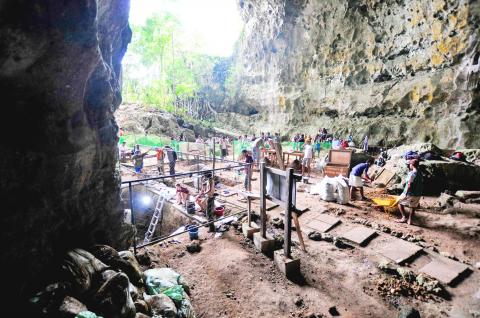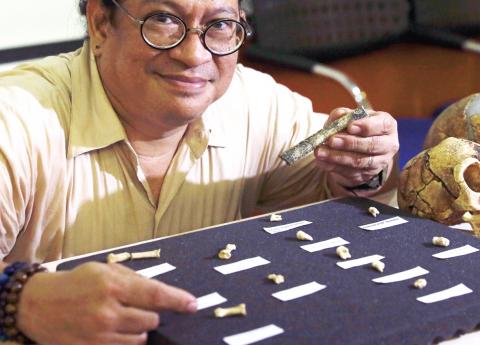Thirteen fossil bones and teeth excavated in a cave in the Philippines represent an enigmatic previously unknown human species, probably small in stature and possessing an unexpected mix of archaic and modern traits, scientists said on Wednesday.
The discovery of remains of at least three individuals from this species, named Homo luzonensis, in Callao Cave on the northern part of Luzon marked the second time in the 21st century that a bygone member of the human family has been found on Southeast Asian islands.
The researchers were unable to extract DNA, but did determine that one of the individuals lived 67,000 years ago and the other 50,000 years ago.

Photo: AFP / Florent Detroit
In 2003, fossils of another island-dwelling species — Homo floresiensis, dubbed the “Hobbit” due to its diminutive size — were unearthed in a cave on the Indonesian island of Flores, about 3,000km from the Luzon site.
There is no indication the two species interacted or were closely related.
Homo luzonensis was a contemporary not only of the Hobbit, but of our own species, Homo sapiens, which emerged in Africa about 300,000 years ago.

Photo: AP
The scientists said they could not rule out the possibility that the arrival of our species in the region contributed to the demise of Homo luzonensis.
The Hobbit also disappeared about 50,000 years ago at the same time Homo sapiens were spreading through the region.
The Luzon and Flores discoveries demonstrate that the story of human evolution is more complicated than previously understood, with Asia offering up surprises, potentially with more to come, the researchers said.
The researchers were circumspect in describing the physical appearance and lifestyle of Homo luzonensis, known only from a sparse assemblage of hand and foot bones, and teeth from two adults and one juvenile, with no skull fossils.
Based on tooth size in particular, it appears it might have been much smaller than Homo sapiens, but it is unclear whether it was as little as the Hobbit, which was about 1m tall.
“We have to stay cautious about it, especially because people will immediately have Homo floresiensis in mind as a ‘model’ for the physical appearance of Homo luzonensis, which was certainly not the case,” said paleoanthropologist Florent Detroit of the Musee de l’Homme-Museum National d’Histoire Naturelle in Paris.
“We can only speculate but it might be only in the range of a pygmy Homo sapiens,” said archeologist Armand Mijares, leader of the Callao Archaeological Project.
The research was published in the journal Nature.
Based on animal bones with butchering marks found at the site, it appears that these people ate meat and might have used stone tools, Detroit said.
The fossils from the cave in the foothills of Luzon’s northern Sierra Madre mountains, boasted a combination of anatomical features setting it apart from other human species.
Some characteristics were similar to Homo sapiens as well as the Hobbit. Other traits were so archaic that they resembled Australopithecus, an earlier member of the human evolutionary lineage that died out about 2 million years ago, as well as the ancient human species Homo habilis and Homo erectus.
“For years — and until less than 20 years ago — human evolution in Asia was seen as very simple, with Homo erectus going out of Africa, settling in East and Southeast Asia, and then nothing happened until the arrival of Homo sapiens at around 40,000 to 50,000 years ago and its ‘conquest’ of every region on Earth,” Detroit said.
“With the discoveries made on the field — fossils — and in the lab, for instance genetics, we now know that it was a much more complex evolutionary history, with several distinct species contemporaneous with Homo sapiens, interbreeding events, extinctions, et cetera,” Detroit added. “Homo sapiens was definitely not alone on Earth.”

Four people jailed in the landmark Hong Kong national security trial of "47 democrats" accused of conspiracy to commit subversion were freed today after more than four years behind bars, the second group to be released in a month. Among those freed was long-time political and LGBTQ activist Jimmy Sham (岑子杰), who also led one of Hong Kong’s largest pro-democracy groups, the Civil Human Rights Front, which disbanded in 2021. "Let me spend some time with my family," Sham said after arriving at his home in the Kowloon district of Jordan. "I don’t know how to plan ahead because, to me, it feels

‘A THREAT’: Guyanese President Irfan Ali called on Venezuela to follow international court rulings over the region, whose border Guyana says was ratified back in 1899 Misael Zapara said he would vote in Venezuela’s first elections yesterday for the territory of Essequibo, despite living more than 100km away from the oil-rich Guyana-administered region. Both countries lay claim to Essequibo, which makes up two-thirds of Guyana’s territory and is home to 125,000 of its 800,000 citizens. Guyana has administered the region for decades. The centuries-old dispute has intensified since ExxonMobil discovered massive offshore oil deposits a decade ago, giving Guyana the largest crude oil reserves per capita in the world. Venezuela would elect a governor, eight National Assembly deputies and regional councilors in a newly created constituency for the 160,000

North Korea has detained another official over last week’s failed launch of a warship, which damaged the naval destroyer, state media reported yesterday. Pyongyang announced “a serious accident” at Wednesday last week’s launch ceremony, which crushed sections of the bottom of the new destroyer. North Korean leader Kim Jong-un called the mishap a “criminal act caused by absolute carelessness.” Ri Hyong-son, vice department director of the Munitions Industry Department of the Party Central Committee, was summoned and detained on Sunday, the Korean Central News Agency (KCNA) reported. He was “greatly responsible for the occurrence of the serious accident,” it said. Ri is the fourth person

Poland is set to hold a presidential runoff election today between two candidates offering starkly different visions for the country’s future. The winner would succeed Polish President Andrzej Duda, a conservative who is finishing his second and final term. The outcome would determine whether Poland embraces a nationalist populist trajectory or pivots more fully toward liberal, pro-European policies. An exit poll by Ipsos would be released when polls close today at 9pm local time, with a margin of error of plus or minus 2 percentage points. Final results are expected tomorrow. Whoever wins can be expected to either help or hinder the